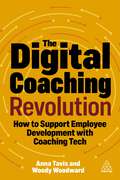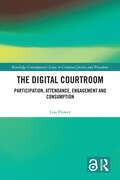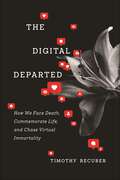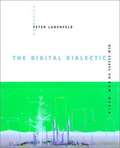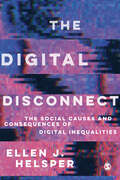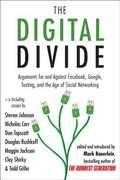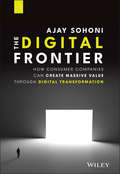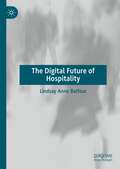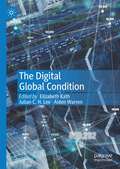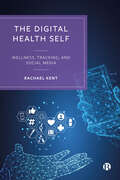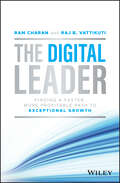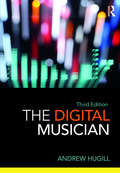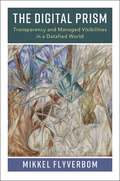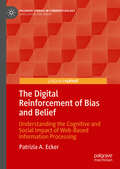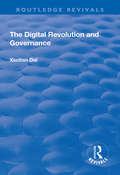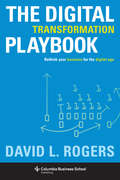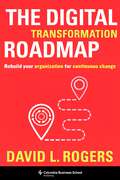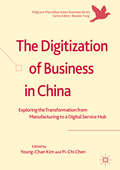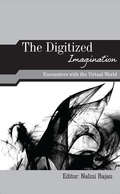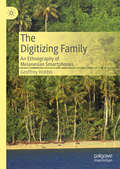- Table View
- List View
The Digital Coaching Revolution: How to Support Employee Development with Coaching Tech
by Anna Tavis Woody WoodwardDigital coaching is transforming employee experience and the future of work as we know it. Discover what you need to look for in digital coaching services before signing or renewing a contract with a provider. Digital coaching offers organizations an effective, scalable and personalized approach to employee development that can transform an organization's entire workforce. This technology helps organizations seamlessly schedule, track and manage coaching services as well as evaluate ROI in ways previously unimaginable. The Digital Coaching Revolution is an essential resource for talent management, employee experience, L&D and HR business partners considering or already working with a digital coaching provider, platform or service. Written by Anna Tavis and Woody Woodward, The Digital Coaching Revolution includes information to help you scale digital coaching across your workforce, whether your C-suite is already on board or not. The chapters offer insight into how to determine what will help every company's specific needs, what questions to ask a digital coaching provider before signing or renewing a contract and how to use the data to get more out of this service. With case studies from large organizations that have found success in digital coaching including Visa, CVS and Hilton, this book is the resource you need to upgrade your organization's approaches to employee experience, L&D and broader HR initiatives.
The Digital Courtroom: Participation, Attendance, Engagement and Consumption (Routledge Contemporary Issues in Criminal Justice and Procedure)
by Lisa FlowerThe digitalisation of courtrooms brings both opportunities and challenges to the judicial process, shaping our understandings of trials and their participants in a myriad of, at times, unexpected ways, and transforming how we participate in, attend, engage with, and consume trials. While digital tools offer potential benefits, they can also impact core aspects of judicial integrity, such as the conduct of legal proceedings and participants’ experiences, as well as introducing additional layers of complexity – sometimes problematic – in how trials are portrayed in popular culture. By exploring these developments, the book highlights the importance of a thoughtful approach to digital integration – one that carefully considers its implications for procedural fairness, public trust, and the perceived legitimacy of the legal system. The author examines the social construction of courts in the digital age, arguing that digitalisation is not merely transforming the tools of justice but also redefining the very essence of the justice experience and reshaping our perceptions of trials and their participants. The work will be a valuable resource for scholars and students in the social sciences, law and all those interested in digitalisation and society.
The Digital Departed: How We Face Death, Commemorate Life, and Chase Virtual Immortality
by Timothy RecuberA fascinating exploration of the social meaning of digital deathFrom blogs written by terminally ill authors to online notes left by those considering suicide, technology has become a medium for the dead and the dying to cope with the anxiety of death. Services like artificial intelligence chatbots, mind-uploading, and postmortem blog posts offer individuals the ability to cultivate their legacies in a bid for digital immortality. The Digital Departed explores the posthumous internet world from the perspective of both the living and the dead.Timothy Recuber traces how communication beyond death evolved over time. Historically, the methods of mourning have been characterized by unequal access to power and privilege. However, the internet offers more agency to the dead, allowing users accessibility and creativity in curating how they want to be remembered.Based on hundreds of blog posts, suicide notes, Twitter hashtags, and videos, Recuber examines the ways we die online, and the digital texts we leave behind. Combining these data with interviews, surveys, analysis of news coverage, and a historical overview of the relationship between death and communication technology going back to pre-history, The Digital Departed explains what it means to live and die on the internet today. In this thought-provoking and uniquely troubling work, Recuber shows that although we might pass away, our digital souls live on, online, in a kind of purgatory of their own.
The Digital Dialectic: New Essays On New Media
by Peter LunenfeldComputers linked to networks have created the first broadly used systems that allow individuals to create, distribute, and receive audiovisual content with the same box. They challenge theorists of digital culture to develop interaction-based models to replace the more primitive models that allow only passive use. The Digital Dialectic is an interdisciplinary jam session about our visual and intellectual cultures as the computer recodes technologies, media, and art forms. Unlike purely academic texts on new media, the book includes contributions by scholars, artists, and entrepreneurs, who combine theoretical investigations with hands-on analysis of the possibilities (and limitations) of new technology. The key concept is the digital dialectic: a method to ground the insights of theory in the constraints of practice. The essays move beyond journalistic reportage and hype into serious but accessible discussion of new technologies, new media, and new cultural forms.
The Digital Difference
by W. Russell NeumanW. Russell Neuman examines how the transition from the industrial-era media of one-way publishing and broadcasting to the two-way digital era of online search and social media has affected the dynamics of public life. The issues range from propaganda studies and Big Brother to information overload and Internet network neutrality.
The Digital Disconnect: The Social Causes and Consequences of Digital Inequalities
by Ellen HelsperWith the increased digitisation of society comes an increased concern about who is left behind. From societal causes to the impact of everyday actions, The Digital Disconnect explores the relationship between digital and social inequalities, and the lived consequences of digitisation. Ellen Helsper goes beyond questions of digital divides and who is connected. She asks why and how social and digital inequalities are linked and shows the tangible outcomes of socio-digital inequalities in everyday lives. The book: Introduces the key theories and concepts needed to understand both ‘traditional’ and digital inequalities research. Investigates a range of socio-digital inequalities, from digital access and skills, to civic participation, social engagement, and everyday content creation and consumption. Brings research to life with a range of qualitative vignettes, drawing out the personal experiences that lay at the heart of global socio-digital inequalities. The Digital Disconnect is an expert exploration of contemporary theory, research and practice in socio-digital inequalities. It is also an urgent and impassioned call to broaden horizons, expand theoretical and methodological toolkits, and work collectively to help achieve a fairer digital future for all. Ellen J. Helsper is Professor of Digital Inequalities at the Department of Media and Communications at London School of Economics and Political Science.
The Digital Disconnect: The Social Causes and Consequences of Digital Inequalities
by Ellen HelsperWith the increased digitisation of society comes an increased concern about who is left behind. From societal causes to the impact of everyday actions, The Digital Disconnect explores the relationship between digital and social inequalities, and the lived consequences of digitisation. Ellen Helsper goes beyond questions of digital divides and who is connected. She asks why and how social and digital inequalities are linked and shows the tangible outcomes of socio-digital inequalities in everyday lives. The book: Introduces the key theories and concepts needed to understand both ‘traditional’ and digital inequalities research. Investigates a range of socio-digital inequalities, from digital access and skills, to civic participation, social engagement, and everyday content creation and consumption. Brings research to life with a range of qualitative vignettes, drawing out the personal experiences that lay at the heart of global socio-digital inequalities. The Digital Disconnect is an expert exploration of contemporary theory, research and practice in socio-digital inequalities. It is also an urgent and impassioned call to broaden horizons, expand theoretical and methodological toolkits, and work collectively to help achieve a fairer digital future for all. Ellen J. Helsper is Professor of Digital Inequalities at the Department of Media and Communications at London School of Economics and Political Science.
The Digital Divide
by Mark BauerleinThis definitive work on the perils and promise of the social- media revolution collects writings by today's best thinkers and cultural commentators, with an all-new introduction by Bauerlein. Twitter, Facebook, e-publishing, blogs, distance-learning and other social media raise some of the most divisive cultural questions of our time. Some see the technological breakthroughs we live with as hopeful and democratic new steps in education, information gathering, and human progress. But others are deeply concerned by the eroding of civility online, declining reading habits, withering attention spans, and the treacherous effects of 24/7 peer pressure on our young. With The Dumbest Generation, Mark Bauerlein emerged as the foremost voice against the development of an overwhelming digital social culture. But The Digital Divide doesn't take sides. Framing the discussion so that leading voices from across the spectrum, supporters and detractors alike, have the opportunity to weigh in on the profound issues raised by the new media-from questions of reading skills and attention span, to cyber-bullying and the digital playground- Bauerlein's new book takes the debate to a higher ground. The book includes essays by Steven Johnson, Nicholas Carr, Don Tapscott, Douglas Rushkoff, Maggie Jackson, Clay Shirky, Todd Gitlin, and many more. Though these pieces have been previously published, the organization of The Digital Divide gives them freshness and new relevancy, making them part of a single document readers can use to truly get a handle on online privacy, the perils of a plugged-in childhood, and other technology-related hot topics. Rather than dividing the book into "pro" and "con" sections, the essays are arranged by subject-"The Brain, the Senses," "Learning in and out of the Classroom," "Social and Personal Life," "The Millennials," "The Fate of Culture," and "The Human (and Political) Impact. " Bauerlein incorporates a short headnote and a capsule bio about each contributor, as well as relevant contextual information about the source of the selection. Bauerlein also provides a new introduction that traces the development of the debate, from the initial Digital Age zeal, to a wave of skepticism, and to a third stage of reflection that wavers between criticism and endorsement. Enthusiasms for the Digital Age has cooled with the passage of time and the piling up of real-life examples that prove the risks of an online-focused culture. However, there is still much debate, comprising thousands of commentaries and hundreds of books, about how these technologies are rewriting our futures. Now, with this timely and definitive volume, readers can finally cut through the clamor, read the the very best writings from each side of The Digital Divide, and make more informed decisions about the presence and place of technology in their lives. .
The Digital Frontier: How Consumer Companies Can Create Massive Value Through Digital Transformation
by Ajay SohoniDiscover how to move forward with your own company’s digital transformation with this accessible new resource from a global leader in his field In The Digital Frontier, experienced executive and distinguished author Ajay Sohoni delivers a relatable and readable reference for corporate executives who need the knowledge and confidence to build lasting digital change within their enterprise. From marketing to commercial, supply chain, and finance, the book offers actionable insights in an accessible format, full of anecdotes, humor, and case examples. You’ll learn which areas to focus on and which not to worry about as you craft your own custom transformation journey. In the book, you’ll also find: A demystification of the startup world for executives and an explanation of why unicorns exist (and so often ultimately fail) A detailed description of the digital transformation gripping companies across a variety of industries in functional areas including advertising, engagement, commerce, product development, manufacturing, and corporate functions A simplified 4-stage framework for companies to start from scratch and build valuable use cases Perfect for executives in consumer-facing companies, corporate managers and leaders, business unit heads and management teams, The Digital Frontier is also an indispensable guide for digital non-natives trying to make sense of, and keep up with, the rapidly changing world around them.
The Digital Future of Hospitality
by Lindsay Anne BalfourThis book asks how an unconditional welcome to strangers is both challenged and made possible by new digital technologies, machine learning, and human-computer interaction (HCI). It argues that the digital – the advancement of data, the proliferation of machines (embodied or not) in our homes and on our screens, and the millions of lines of code that organize and predict our lives – is not the absence of hospitality but rather the beginning, though not without its challenges. While such an ethic remains more important than ever, The Digital Future of Hospitality updates this enduring philosophical imperative for digital times. Through the lens of cultural studies, intersectional feminism, and posthumanism, this book reanimates hospitality in relation to a series of digital texts that are relevant to the twenty-first century and beyond – android figures on television, virtual domestic assistants, home- and ride-sharing apps, wearable devices, and a renewed cultural obsession with viruses and immunity.
The Digital Global Condition
by Aiden Warren Julian C. H. Lee Elizabeth KathThis book explores how globalization and ubiquity of digital technology combine to create specific global impacts, challenges and opportunities. Although globalization is already associated with the speeding up of interactions and change, digital globalization is characterized by immediacy. The utter pervasiveness opens new global vulnerabilities at international, national, social and personal levels. The Digital Global Condition examines the nature of digital globalization, enabling us to not only inhabit a digital world, but also to understand it, even to live well in it.
The Digital Health Self: Wellness, Tracking and Social Media
by Rachael KentThis is a detailed analysis of how understanding of health management past, present and future has transformed in the digital age. Since the mid-20th century, we have witnessed ‘healthy’ lifestyles being pushed as part of health promotion strategies, both via the state, and through health tracking tools, and narratives of wellness online. This marks a seismic shift from a public welfare state responsibility for health towards individualised practices of digital self-care. Today health has become representative of ‘lifestyle correction' which is performed on social media. Putting the spotlight on neoliberalism and digital technology as pervasive tools that dictate wellness as a moral obligation, Rachael Kent critically analyses how users navigate relationships between self-tracking technologies, social media, and everyday health management.
The Digital Is Kid Stuff: Making Creative Laborers for a Precarious Economy
by Josef NguyenHow popular debates about the so-called digital generation mediate anxieties about labor and life in twenty-first-century America &“The children are our future&” goes the adage, a proclamation that simultaneously declares both anxiety as well as hope about youth as the next generation. In The Digital Is Kid Stuff, Josef Nguyen interrogates this ambivalence within discussions about today&’s &“digital generation&” and the future of creativity, an ambivalence that toggles between the techno-pessimism that warns against the harm to children of too much screen time and a techno-utopianism that foresees these &“digital natives&” leading the way to innovation, economic growth, increased democratization, and national prosperity. Nguyen engages cultural histories of childhood, youth, and creativity through chapters that are each anchored to a particular digital media object or practice. Nguyen narrates the developmental arc of a future creative laborer: from a young kid playing the island fictions of Minecraft, to an older child learning do-it-yourself skills while reading Make magazine, to a teenager posting selfies on Instagram, to a young adult creative laborer imagining technological innovations using design fiction. Focusing on the constructions and valorizations of creativity, entrepreneurialism, and technological savvy, Nguyen argues that contemporary culture operates to assuage profound anxieties about—and to defuse valid critiques of—both emerging digital technologies and the precarity of employment for &“creative laborers&” in twenty-first-century neoliberal America.
The Digital Leader: Finding a Faster, More Profitable Path to Exceptional Growth
by Ram Charan Raj B. VattikutiDigitally transform your organization, one manageable step at a time In The Digital Leader: Finding a Faster, More Profitable Path to Exceptional Growth, a team of visionary entrepreneurs delivers an authoritative and engaging roadmap demonstrating how to digitalize your business by taking small, achievable steps that yield measurable, near-term results. In this handbook of concrete strategies and methods, the authors show you how to pinpoint and implement bite-sized projects that sync up with your business priorities. You&’ll learn how to find and choose between the digital enablement options available to you while discovering the tools you need to explain their value to stakeholders and get much-needed buy-in from executives, managers, and employees. You&’ll also: Learn about the value of experimentation, continuous innovation, and how to generate dramatic transformation by using incremental changes to your advantage Find out how to digitalize one piece of your business at a time, instead of taking on a gargantuan transformation all at once that is destined for failure Discover how to straddle the technology and business worlds and help define each of them to the otherA can&’t-miss resource for executives, managers, and other business leaders, The Digital Leader also belongs in the bookshelves of IT and data professionals seeking to maximize their impact on the businesses around them.
The Digital Musician (Third Edition)
by Andrew Hugill<p>The Digital Musician, Third Edition is an introductory textbook for creative music technology and electronic music courses. Written to be accessible to students from any musical background, this book examines cultural awareness, artistic identity and musical skills, offering a system-agnostic survey of digital music creation. Each chapter presents creative projects that reinforce concepts, as well as case studies of real musicians and discussion questions for further reflection. <p>This third edition has been updated to reflect developments in an ever-changing musical landscape―most notably the proliferation of mobile technologies―covering topics such as collaborative composition, virtual reality, data sonification and digital scores, while encouraging readers to adapt to continuous technological changes. With an emphasis on discovering one’s musical voice and identity, and tools and ideas that are relevant in any musical situation, The Digital Musician is sure to be an invaluable student resource for years to come.</p>
The Digital Prism: Transparency and Managed Visibilities in a Datafied World
by Mikkel FlyverbomMany people are concerned about the unchecked powers of tech giants and the hidden operations of big data and algorithms. Yet we do not have the vocabularies to properly articulate how these digital transformations shape our lives. This book shows how the management of visibilities - our digital footprints - is a central force in the digital transformation of societies and politics. Seen through the prism of digital technologies and data, the lives of people and structuring of organizations take new shapes in our understanding. Making sense of these requires that we push beyond common ways of thinking about transparency and surveillance, and look at how managing visibilities is a central but overlooked force that influences how people live, how organizations work and how societies and politics operate.
The Digital Reinforcement of Bias and Belief: Understanding the Cognitive and Social Impact of Web-Based Information Processing (Palgrave Studies in Cyberpsychology)
by Patrizia A. EckerThis book explores how digital environments amplify confirmation bias, shaping the way individuals consume, create, and recall information. Focusing on web-based platforms such as social media and online news, the book examines the role of active content creation and temporal dynamics in reinforcing existing beliefs and perpetuating cognitive feedback loops. Through original research and case studies, it highlights the interplay between algorithmic curation, participatory engagement, and misinformation spread in online spaces. This book fills a critical gap in research on the psychological mechanisms underlying bias formation in the digital age. It provides insights for tech leaders, media experts, and policymakers seeking to understand and mitigate the cognitive and societal impact of online information processing. By bridging the fields of cyberpsychology, media studies, and artificial intelligence, it offers strategies for fostering more balanced digital ecosystems.
The Digital Revolution and Governance (Routledge Revivals)
by Xiudian DaiThis title was first published in 2000. This text examines the politics of the digital age, looking at topics including new industrial policies, the implications of the Internet and global governance of innovation.
The Digital Transformation Playbook: Rethink Your Business for the Digital Age (Columbia Business School Publishing Ser.)
by David RogersRethink your business for the digital age.Every business begun before the Internet now faces the same challenge: How to transform to compete in a digital economy?Globally recognized digital expert David L. Rogers argues that digital transformation is not about updating your technology but about upgrading your strategic thinking. Based on Rogers's decade of research and teaching at Columbia Business School, and his consulting for businesses around the world, The Digital Transformation Playbook shows how pre-digital-era companies can reinvigorate their game plans and capture the new opportunities of the digital world.Rogers shows why traditional businesses need to rethink their underlying assumptions in five domains of strategy—customers, competition, data, innovation, and value. He reveals how to harness customer networks, platforms, big data, rapid experimentation, and disruptive business models—and how to integrate these into your existing business and organization.Rogers illustrates every strategy in this playbook with real-world case studies, from Google to GE, from Airbnb to the New York Times. With practical frameworks and nine step-by-step planning tools, he distills the lessons of today's greatest digital innovators and makes them usable for businesses at any stage.Many books offer advice for digital start-ups, but The Digital Transformation Playbook is the first complete treatment of how legacy businesses can transform to thrive in the digital age. It is an indispensable guide for executives looking to take their firms to the next stage of profitable growth.
The Digital Transformation Roadmap: Rebuild Your Organization for Continuous Change
by David RogersToday, every business is talking about digital transformation. With the acceleration of new technologies, every organization knows it must adapt to survive. But by their own admission, 70 percent of businesses are failing to transform. Across industries, established companies are held back by bureaucracy, inertia, and old ways of working. How can businesses break through to drive real change?The Digital Transformation Roadmap provides every leader with the answer. Acclaimed author and C-suite advisor David L. Rogers argues that businesses must transform not just products and business models—they must transform the organization itself. Based on two decades of research and advising companies around the world, Rogers identifies the five biggest barriers to digital transformation: vision, priorities, experimentation, governance, and capabilities. He then shows how any business can evolve by heeding the lessons of companies such as Disney, Walmart, Mastercard, Air Liquide, and the New York Times Company.The Digital Transformation Roadmap provides a practical blueprint for organizational change, illustrated with real-world case studies and step-by-step planning tools. Rogers shows every leader how to think beyond the churn of new technologies and rebuild their organization for a world of constant change.
The Digitization of Business in China: Exploring the Transformation from Manufacturing to a Digital Service Hub (Palgrave Macmillan Asian Business Series)
by Pi-Chi Chen Young-Chan KimOne of the first of its kind, this book examines the digitalization of Chinese businesses both theoretically and practically. Taking a fresh and unique approach, the authors seek to adopt individual theories for each empirical case explored and investigate the dramatic digital transformation that Chinese firms have undergone in recent years. With a particular focus on social networks, the authors observe and analyze the way that digitized applications can interlink with financial systems, developing new capabilities that help to yield competitive advantage. Covering both small to medium sized enterprises (SMEs) and globally orientated multinational enterprises (MNEs), this book is a valuable resource for those researching Asian business, or international business more generally, as well as innovation and technology management.
The Digitized Imagination: Encounters with the Virtual World
by Nalini RajanThe work explores the complex and profound implications of digital technology for a stunning variety of spaces, ranging from science and cinema to citizenship and bazaars. It maps the multiple ways in which the 'new' media rewrites the 'old', and the dilemmas and issues that they pitch - questioning, in turn, received notions of knowledge, legality, ethics, privacy, identity and community. The book argues that the old and the new media are neither radically different nor the same: while the mutability of a narrative, whether on the printed page or on a digitally recorded disk remains, there are intrinsic differences between print and digital print.
The Digitizing Family: An Ethnography of Melanesian Smartphones
by Geoffrey HobbisAt once a digital ethnography of smartphones and a classically conceived village-based ethnography, this book relocates the study of digital technologies to rural Melanesia, with a focus on the Lau of Malaita, Soloman Islands. In this ‘technography’, Geoffrey Hobbis studies the materiality and functional attributes of smartphones and their object biographies—modes of acquisition, maintenance, uses, limitations and the problems specific to this region in adopting and adapting smartphones in everyday life. As he examines the various uses of smartphones, as both telephone and multimedia device, Hobbis also explores the social and cultural transformations, the hopes and uncertainties, with which they are associated. Ultimately, in bringing together a study of digital technologies with classical anthropological theory, The Digitizing Family develops a theory of smartphones as kinship technologies and supercompositional objects.
The Dignity of Resistance: Women Residents' Activism in Chicago Public Housing
by Roberta M. Feldman Susan StallThe Dignity of Resistance chronicles the four decade history of Chicago's Wentworth Gardens public housing residents' grassroots activism. This comprehensive case study explores why and how these African-American women creatively and effectively engaged in organizing efforts to resist increasing government disinvestment in public housing and the threat of demolition. Roberta M. Feldman and Susan Stall, utilizing a multi-disciplinary lens, explore the complexity and resourcefulness of Wentworth women's grassroots, organizing the ways in which their identities as poor African-American women and mothers both circumscribe their lives and shape their resistance. Through the inspirational voices of the activists, Feldman and Stall challenge portrayals of public housing residents as passive, alienated victims of despair. We learn instead how women residents collectively have built a cohesive, vital community, cultivated outside technical assistance, organizational and institutional supports, and have attracted funding - all to support the local facilities, services and programs necessary for the everyday needs for survival, and ultimately to save their home from demolition.
The Dilemma of American Social Welfare
by William M. EpsteinIn the current political climate of the U.S., there are noeasily apparent solutions to the social problems we face.William M. Epstein claims that people in need have been poorly served and misled by the American system of social welfare. This is one of those rare works emanating from a social welfare expert that does not offer easy placebos or simplistic claims based on more money.The Dilemma of American Social Welfare argues against the idea that there are inexpensive cures for serious societal sicknesses. Epstein takes on an immense literature in psychotherapy, social work, and welfare, all offering simple answers to complex problems. Two of the largest social experiments ever undertaken in the U.S. are evaluated in depth. The Negative Income Tax experiments of the 1960s and early 1970s tested the feasibility of an income guarantee; and the Evaluation of State Work/Welfare Initiatives employed a variety of programs to stimulate welfare recipients to find jobs. Epstein also analyzes social services associated with social work and examines approaches to juvenile delinquency and drug addiction.Epstein is blunt in his denial that traditional welfare can readily resolve major social and economic questions of the times. His work, addressed to the malaise in thesocial welfare or helping professions, should serve asan early warning signal that easy solutions are hard for recipients to identify and harder still for donors to put forth. Although it was originally published in the early 1990s, the book remains relevant to political and social questions of the day, which makes it of interest to sociologists, political scientists, policymakers, researchers, and others interested in policy and urban studies.
